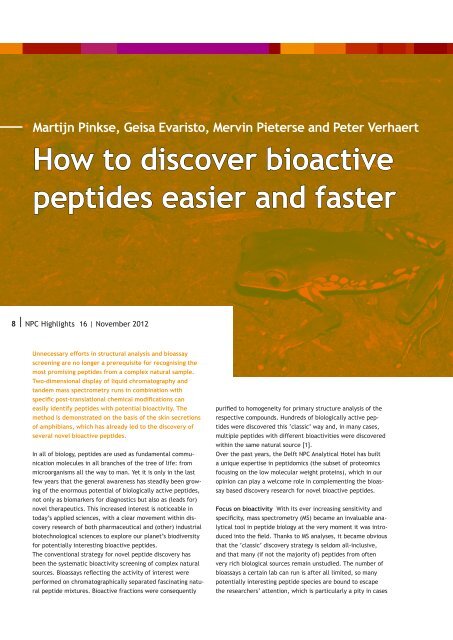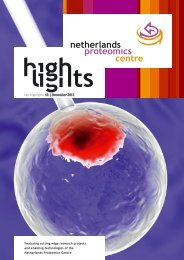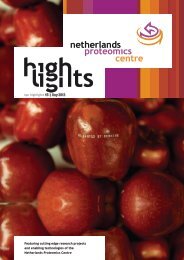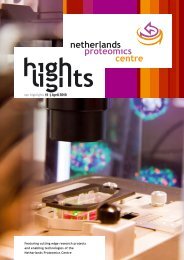Martijn Pinkse, Geisa Evaristo, Mervin Pieterse and Peter VerhaertHow to discover bioactivepeptides easier and faster | <strong>NPC</strong> Highlights 16 | November 2012Unnecessary efforts in structural analysis and bioassayscreening are no longer a prerequisite for recognising themost promising peptides from a complex natural sample.Two-dimensional display of liquid chromatography andtandem mass spectrometry runs in combination withspecific post-translational chemical modifications caneasily identify peptides with potential bioactivity. Themethod is demonstrated on the basis of the skin secretionsof amphibians, which has already led to the discovery ofseveral novel bioactive peptides.In all of biology, peptides are used as fundamental communicationmolecules in all branches of the tree of life: frommicroorganisms all the way to man. Yet it is only in the lastfew years that the general awareness has steadily been growingof the enormous potential of biologically active peptides,not only as biomarkers for diagnostics but also as (leads for)novel therapeutics. This increased interest is noticeable intoday’s applied sciences, with a clear movement within discoveryresearch of both pharmaceutical and (other) industrialbiotechnological sciences to explore our planet’s biodiversityfor potentially interesting bioactive peptides.The conventional strategy for novel peptide discovery hasbeen the systematic bioactivity screening of complex naturalsources. Bioassays reflecting the activity of interest wereperformed on chromatographically separated fascinating naturalpeptide mixtures. Bioactive fractions were consequentlypurified to homogeneity for primary structure analysis of therespective compounds. Hundreds of biologically active peptideswere discovered this ‘classic’ way and, in many cases,multiple peptides with different bioactivities were discoveredwithin the same natural source [1].Over the past years, the Delft <strong>NPC</strong> Analytical Hotel has builta unique expertise in peptidomics (the subset of proteomicsfocusing on the low molecular weight proteins), which in ouropinion can play a welcome role in complementing the bioassaybased discovery research for novel bioactive peptides.Focus on bioactivity With its ever increasing sensitivity andspecificity, mass spectrometry (MS) became an invaluable analyticaltool in peptide biology at the very moment it was introducedinto the field. Thanks to MS analyses, it became obviousthat the ‘classic’ discovery strategy is seldom all-inclusive,and that many (if not the majority of) peptides from oftenvery rich biological sources remain unstudied. The number ofbioassays a certain lab can run is after all limited, so manypotentially interesting peptide species are bound to escapethe researchers’ attention, which is particularly a pity in cases
What this research is about:Screening natural sources forpharmaceutical peptidesShort peptides play a crucial role in all sorts of biological processes. They take care of the communication inthe body, but can also have an antibiotic, antiviral or fungicidal activity. Therefore peptides have high pharmaceuticalpotential. “Many peptides have not yet been discovered. They are very often missed by conventionalproteomics methods that are not designed to detect them,” says Peter Verhaert, professor of AnalyticalBiotechnology and Innovative Peptide Biology at Delft University of Technology. “Besides that, the classic studyof peptides in natural samples is still a very laborious and time-consuming task. If we were able to recognisepeptides that have promising pharmaceutical potential at an earlier stage, it would save a great deal of effort.”In this article Verhaert and co-workers describe a novel generic method for discovering peptides with bioactiveproperties in complex mixtures obtained from natural sources which would otherwise remain unrevealed.He uses a combination of liquid chromatography with tandem mass spectrometry analysis and when necessarychemical modifications to identify potentially bioactive peptides. “We look at a set of typical structuralelements that are indicators for bioactive compounds. Sometimes we make those visible by giving the samplea chemical treatment and by comparing it with the untreated sample,” explains Verhaert. After identificationand characterisation of the promising peptides, final proof of the bioactivity has to be demonstrated using abioassay.The method is applicable on all kinds of complex mixtures. Verhaert uses as model system his favouritenatural source: the frog. These animals secrete a wide variety of bioactive peptides via glands in their skin aschemical defence. “Their skin is their only method of protection against all sorts of predators and microorganisminfections. It is an abundant source of undiscovered peptides with bioactive properties, which includepeptides with antimicrobial activity, peptides that inhibit enzymes or paralyse muscles. It also provides peptidesfor accelerating wound repair, which could in time deliver a more effective drug for wound healing forhumans,” Verhaert says.| <strong>NPC</strong>3 T3: Proteome Biology of Micro-organismswhere the natural supply of peptides is very precious.It is evident that complex biological peptide collectionsconsist of a mix of the actual bioactive ones as well as theirbreakdown products and irrelevant protein-derived ‘contaminants’.The brute force structural elucidation of all the(non-tryptic) peptides is something which may become possiblein the future, but which today is still unrealistic. Havinga system which helps to focus on those peptides that are themost likely to exhibit bioactivity at one’s disposal is thereforeextremely useful.Figure 1 | Lacking mechanical defence systems, frogs, toads andsalamanders are very vulnerable and rely entirely on the activity of thespecific collection of peptides (and other biochemical compounds) secretedon their body surface to cope with environmental hazards, includingmicrobial infection and animal predation [picture of Brazilian walking leaffrog, Phyllomedusa burmeisteri, during peptide secretion ‘milking’ bypeptidomics research scientist].Structural families Looking a bit deeper into the structuralbiology of bioactive peptides, one sees that, other than exhibitinga particular bioactivity, they tend to share special characteristicsthat differentiate them from their inactive counterparts.Indeed, the many bioactive peptides known today canbe grouped into several structural families, reflecting thatcertain structural motifs tend to be common among peptidegroups, as well as conserved between various taxa of organisms.These common conserved structural domains frequentlycoincide with the biologically active site of the peptide under






